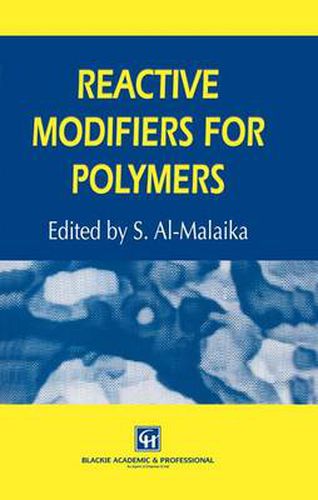Readings Newsletter
Become a Readings Member to make your shopping experience even easier.
Sign in or sign up for free!
You’re not far away from qualifying for FREE standard shipping within Australia
You’ve qualified for FREE standard shipping within Australia
The cart is loading…






This title is printed to order. This book may have been self-published. If so, we cannot guarantee the quality of the content. In the main most books will have gone through the editing process however some may not. We therefore suggest that you be aware of this before ordering this book. If in doubt check either the author or publisher’s details as we are unable to accept any returns unless they are faulty. Please contact us if you have any questions.
Chemical modification of polymers by reactive modifiers is no longer an academic curiosity but a commercial reality that has delivered a diverse range of speciality materials for niche markets: reactively grafted styrenic alloys, maleated polyolefins, super-tough nylons, silane modified and moisture-cured polyolefins, and thermoplastic elastomers, are but few exam ples of commercial successes. Although the approach of reactive modification of polymers has been largely achieved either in solution or in the solid state (through in situ reactions in polymer melts), it is the latter route that has attracted most attention in the last two decades owing to its flexibility and cost-effective ness. This route, referred to as reactive processing, focuses on the use of suitable reactive modifier(s) and the adoption of conventional polymer processing machinery, an extruder or a mixer, as a chemical reactor, to perform in situ targeted reactions for chemical modification of preformed polymers. This relatively simple, though scientifically highly challenging, approach to reactive modification offers unique opportunities in exploiting various reactive modifiers for the purpose of altering and transforming in a controlled manner the properties of preformed commercial polymers into new/speciality materials with tailor-made properties and custom-designed performance for target applications. Such an economically attractive route constitutes a radical diversion away from the traditional practices of manufacturing new polymers from monomers which involves massive in vestments in sophisticated technologies and chemical plants.
$9.00 standard shipping within Australia
FREE standard shipping within Australia for orders over $100.00
Express & International shipping calculated at checkout
This title is printed to order. This book may have been self-published. If so, we cannot guarantee the quality of the content. In the main most books will have gone through the editing process however some may not. We therefore suggest that you be aware of this before ordering this book. If in doubt check either the author or publisher’s details as we are unable to accept any returns unless they are faulty. Please contact us if you have any questions.
Chemical modification of polymers by reactive modifiers is no longer an academic curiosity but a commercial reality that has delivered a diverse range of speciality materials for niche markets: reactively grafted styrenic alloys, maleated polyolefins, super-tough nylons, silane modified and moisture-cured polyolefins, and thermoplastic elastomers, are but few exam ples of commercial successes. Although the approach of reactive modification of polymers has been largely achieved either in solution or in the solid state (through in situ reactions in polymer melts), it is the latter route that has attracted most attention in the last two decades owing to its flexibility and cost-effective ness. This route, referred to as reactive processing, focuses on the use of suitable reactive modifier(s) and the adoption of conventional polymer processing machinery, an extruder or a mixer, as a chemical reactor, to perform in situ targeted reactions for chemical modification of preformed polymers. This relatively simple, though scientifically highly challenging, approach to reactive modification offers unique opportunities in exploiting various reactive modifiers for the purpose of altering and transforming in a controlled manner the properties of preformed commercial polymers into new/speciality materials with tailor-made properties and custom-designed performance for target applications. Such an economically attractive route constitutes a radical diversion away from the traditional practices of manufacturing new polymers from monomers which involves massive in vestments in sophisticated technologies and chemical plants.